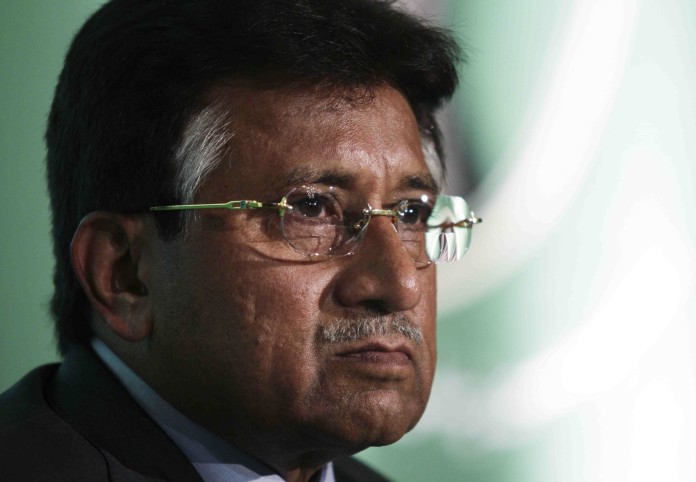Moeed Pirzada | The News |
This week, hundreds of thousands of people across Pakistan ended up watching the documentary “Dinner with the President” co-produced by acclaimed filmmakers Sabiha Soomar and Dr Sathanathan.
Sabiha is Pakistani but her co-producer, Dr Sathanathan, is Sri Lankan in origin. Working together they are able to fuse an internal view with an external comment. The film was recently awarded the Grand Jury Prize at the UAE Film Festival and shortlisted at the Sundance Cinema Competition. But that is not why it looked shockingly different; it was different because its hero, whom the narrator approached again and again in her quest to understand the country, was Pakistan’s president, Gen (retired) Pervez Musharraf.
Given the changed times and moods it is not easy to predict how most Pakistanis viewed this film. But I am sure one man, one retired general, was watching somewhere sitting in Army House, thinking, what went wrong?
Sabiha Soomar’s documentary introduces Musharraf as the hero who had replaced a prime minister, Nawaz Sharif, and takes us back to an era in which Musharraf was the darling of the liberals and the public at large wary of the corrupt politicians. So we end up with at least two basic questions: One, was Gen Musharraf ever really popular in Pakistan? And how the maligned politicians staged a comeback?
Gen Musharraf was at the crest of at least two waves of popular sentiments: One, in October of 1999 when he kicked out Nawaz Sharif’s government that was constitutionally strong but had lost all political steam; two, immediately after 9/11, when he was seen as a messiah by the chattering liberal classes for taking a quick decision to align himself with the United States against Taliban.
The American connection was Musharraf’s support base but gradually it was his biggest liability as well, as he was increasingly seen as a stooge perceived to be against the interests of Pakistan. For our understanding of the second question, as to how politicians strike a comeback, it is important to emphasise that Musharraf’s popularity was essentially a function of the media, the civil society NGO’s and the chattering liberal circles – in other words, opinion-making sections of the society – but the politicians’ support base remained intact, thanks mostly to the feudal vote banks.
Feudal vote banks are captured territories where large pockets of populations remain trapped in age-old narratives of religion, ego and respect. This becomes most obvious when we look at the PPP’s support base. All negative discussions emanating from the print and electronic media produced very little dents in the PPP vote banks in the Sindhi and Saraiki belts. However, Nawaz Sharif’s vote bank represents somewhat of an interesting change and may be an indication of the times to come.
Even looking casually at the results of the 2008 elections we can see that Nawaz skilfully created a wave in the large Punjabi heartland from ‘Pindi in the north to Lahore in the South and up to Faislabad. In the United States they use the term Bible Belt to allude to the influence of religion and televangelists. In the context of Pakistan we should consider a new term: “Media Belt.”
Nawaz seems to have derived support from areas clustered around the old G T Road with large pockets of populations, which in the context of Pakistan are more affluent, literate if not educated, and upwardly mobile, who also absorb the maximum impact of Urdu print and electronic media and thus bore the brunt of the lawyers’ movement. So can we argue that a new kind of voting belt is being created where people are more aware of the larger issues of national causes and increasingly form opinions under the spell of the Urdu media? If this is true, then the long-term strategic importance of some media groups to make Lahore their operational base should be analysed seriously.
So, whereas the PPP is seen as the liberal party – because of the presence of the better educated, more anglicised leadership at the top: the likes of Aitzaz Ahsan, Sherry Rehman and Raza Rabbani, and the support of the old left intellectuals in the print media – the overall vote bank of the PPP is generally rural, more under-developed and isolated from the larger currents of consciousness. They persist with an internal narrative of Islam, ego, respect and gender roles which has not been penetrated effectively by the mass media.
Sabiha Soomar’s documentary saw Nawaz Sharif as the prime minister who was in pact with the Islamists to make the Quran the supreme law of the land. And I do hear the chatter that western diplomats, especially the Americans, feel that Nawaz and the PML(N) represent a sophisticated face of the Islamists. This fear may be exaggerated, especially when it is used as an assessment of Nawaz or his associates, but it has certain elements that are interesting.
Sabiha had identified her documentary as a personal journey. Populations have political journeys. And when they move out of the stranglehold of feudalism – as PPP voters will do at some stage – they pass through phases of nationalism or religious identities. US diplomats and Pakistani liberals may be right in seeing a connection between Nawaz Sharif’s support base and the religious parties, but they may themselves be responsible for pushing things in that direction.
